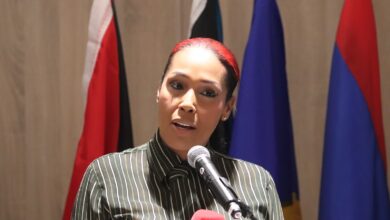On behalf of the people of Jamaica, let me thank you for the opportunity to serve as Co-Chairman at this meeting. I am honoured to co-chair this, the 2nd Joint COTED/COSHOD meeting.
I welcome all delegates to this meeting as it has been a long time, 2001, since both CARICOM bodies have met and there are important items to be addressed on the Agenda.
There is an integral link between trade and culture, education, science & technology, and health issues. This link is clearly reflected on the agenda for this meeting. I cannot over emphasize the importance of the linkages between culture and trade for the development of cultural industries. This is one of the most important issues which will engage us at this significant Joint Meeting of the COTED/COSHOD.
Many of us are now recognising the significant potential of Caribbean cultural industries. In fact, even as we reflect on the data emerging in the global market, that cultural industries is in fact the fastest growing sector of the world’s economy, we also recognize that this area is one of competitive advantage for the region. Our people are extremely creative. Our cultural expressions, especially our music, have penetrated significantly markets all over the world. Our task is to develop political will and to promote policies and programmes, and measures to enhance the capacity of these industries and the players involved in accumulation of wealth and prosperity.
These industries relate directly to our efforts at sustainable development, poverty reduction and wealth creation, as well as positive identity, constructions and productivity.
Lest there be a perception that there is a bias toward cultural issues, I must reiterate the importance of developing a policy framework for the promotion of science, technology, and innovations so as to realise our social and economic goals.
Trade in educational services is an important issue. I am aware of the concerns about the proliferation of foreign institutions in our region which in some cases impact quality of academic programmes in the region. There must be a carefully coordinated national and regional effort to support the strengthening of our UWI so that it too can benefit for Trade in education Services. In this regard, firm support must be given to the proposal for the establishment of a Regional Accreditation Authority for Tertiary Education.
Trade issues which impact on Health is another important agenda item. It is a fact that patented pharmaceuticals create barriers to access to medicines and patent protections oftentimes delay the entry of generic drugs to the market. There are however, many opportunities for addressing these matters at the WHO, WTO and WIPO and other relevant institutions where concerted efforts can be made by the region to resolve these matters.
I know that more substantial points will be raised on these issues as they are discussed during the course of this meeting. I will therefore close by reiterating the importance of our efforts at establishing an appropriate mechanism to provide an open market without cross-border restitutions leading eventually to one regional market. Our objective is to create opportunities and conditions for more competitive production and delivery of goods and services.
There are many challenges to be faced in this process. There is no doubt however that global economic realities will help to underscore the need for urgent action on our part to strengthen the community’s ability to cope with these challenges.





